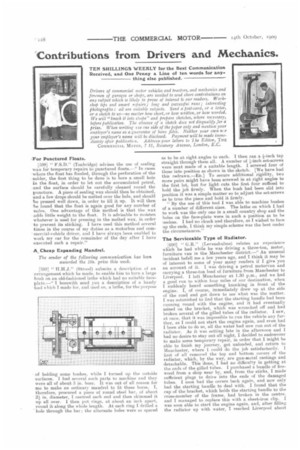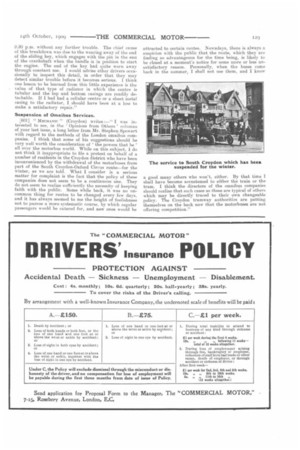Contributions from Drivers and Mechanics.
Page 18

Page 19

If you've noticed an error in this article please click here to report it so we can fix it.
For Punctured Floats,
[598] " F.S.D." (Tonbridge) advises the use of sealing wax for temporary repairs to punctured floats.—" In cases where the float has flooded, through the perforation of the solder, -the first thing to be done is to bore a small hole in the float, in order to let out the accumulated petrol, and the surface should be carefully cleaned round the puncture. A piece of sealing wax should then be obtained, and a few drops should be melted over the hole, and should lbe pressed well down, in order to lill it up. It will then
• be found that the float is again good for any number of miles. One advantage of this method is that the wax adds little weight to the float. Tt is advisable to moisten whatever is used for pressing in the melted wax, in order to prevent its sticking. I have used this method several times in the course of my duties as a motorbus and coin • rnercial-vehicle driver, and I have always been enabled to work my car for the remainder of the day after I have executed such a repair."
&Cheap Expanding Mandrel.
The sender of the following communication has been awarded the 10s. prize this week.
[599] " H.H.J." (Strood) submits a deseription of an arrangement which he made, to enable him to turn a large bush on an old-fashioned lathe which had no suitable faveiplate.—" I herewith send you a description of a handy tool which T made for, and used en. a lathe, for the purpose • of holding some bushes, while I turned up the outside surfaces. I had several such parts to machine and they were all of about 5 in. bore. It Was out of all reason for use to make an ordinary mandrel to fit these bores. T, therefore, procured a piece of round steel bar, of about ' 21 in. diameter, I centred each end and then skimmed it up all over. I then put rings, at about an inch apart, round it along the whole length. At each ring I drilled a • hole through the bar ; the alternate holes were so spaced as to be at right angles to each. I then ran a i-inch tap straight through them all. A number of set-screws were next made of a suitable length. I screwed four of these into position as shown in the sketch. [We have had this redrawn.—En.] To secure additional rigidity, two more pairs might have been screwed in at right angles to the first lot, but for light cuts the first four sufficed to hold the job firmly. When the bush had been slid into position it was a simple matter so to adjust the set-screws as to true the piece and hold it firmly.
" By the use of this tool I was able to machine hushes of a number of different sixes. The lathe on which I had to work was the only one in a small country shop and the holes on the face-plate were in such a position as to be useless. I had no chuck and therefore, as I wished to face up the ends, I think my simple scheme was the best under the circumstances."
The Serviceable Type of Radiator.
600] " G.R." (T.evenshulme) relates an experience which he had while he was driving a three-ton, motor, furniture van in the Manchester district —" An unusual incident befell me a few years ago, and I think it may be of interest to some of your many readers if I give you an account of it. I was driving a petrol motorvan and carrying a three-ton load of furniture from Manchester to Liverpool. I left Manchester at 1.30 p.m., and we had a good run to within four miles of our destination, when I suddenly heard something knocking in front of the engine. I, of course' immediately drew up at the side of the road and got down to see what was the matter. I was astonished to find that the starting handle had been running round with the engine, and it had eventually seized on the bracket, which was wrenched off and had broken several of the gilled tubes of the radiator. I saw, at once, that it was impossible to run the vehicle any further, as I could not start the engine again, and even had I been able to do so, all the water had now run out of the radiator. As it was setting late in the afternoon and I had no desire to stay out all night, I decided to endeavour to make some temporary repair, in order that I might be able to finish my journey, get unloaded, and return to Manchester, where I could do the job satisfactorily. I first of all removed the top and bottom covers of the radiator, which, by the way, are gun-metal castings and detachable. This done, I had no difficulty in getting at the ends of the gilled tubes. I purchased a bundle of firewood from a shop near by, and, from the sticks, I made sufficient plugs to drive into the ends of the damaged tubes. I soon had the covers back again, and now only had the starting handle to deal with. I found that the cap of the bracket, which holds the starting handle to the cross-member of the frame, had broken in the centre. and I managed to replace this with a sheet-iron clip. I %MR soon able to start the engine again, and, after filling the radiator up with water, I reached Liverpool about 9.30 p.m. without any further trouble. The chief cause of this breakdown was due to the wearing away of the end of the sliding key, which engages with the pin in the eau of the crankshaft when the handle is in position to start the engine. The end of the key had Tuts worn away through constant use. I would advise other drivers occasionally to inspect this detail, in order that they may detect similar trouble before it becomes serious. I think one lesson to be learned from this little experience is the value of that type of radiator in which the centre is tubular and the top and bottom casings are readily detachable, If I had had a cellular centre or a sheet metal casing to the radiator, I should have been at a loss to make a satisfactory repair."
Suspension of Omnibus Services.
E601] " MECHANIC " (Croydon) writes:—" I was interested to see, in the Opinions from Others ' columns of your last issue, a long letter from Mr. Stephen Spowart with regard to the methods of the London omnibus companies. I think that some of his suggestions should be very well worth the consideration of the powers that be' all over the motorbus world. While on this subject, I do not think it inappropriate to file a protest on behalf of a number of residents in the Croydon district who have been inconvenienced by the withdrawal of the motorbuses from part of the South Croydon-Oxford Circus route—for the winter, as we are told. What I consider is a serious matter for complaint is the fact that the policy of these companies does not seem to be a continuous one. They do not seem to realize sufficiently the necessity of keeping faith with the public. Some while back, it was no uncommon thing for routes to be changed every few days, and it has always seemed to me the height of foolishness not to pursue a more systematic course, by which regular passengers would be catered for, and new ones would be attracted to certain routes. Nowadays, there is always a suspicion with the public that the route, which they are finding so advantageous for the time being, is likely to be closed at a moment's notice for some more or less unsatisfactory reason. Personally, when the buses come back in the summer, I shall not use them, and I know a good many others who won't, either. By that time I shall have become accustomed to either the train or the tram. I think the directors of the omnibus companies should realize that such cases as these are typical of others which mar be directly traced to their own changeable policy. The Croydon tramway authorities are patting themselves on the back now that the motorbuses are not offering competition."




















